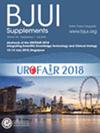Preferences between three options for androgen deprivation therapy: a focus group study
IF 4.4
2区 医学
Q1 UROLOGY & NEPHROLOGY
引用次数: 0
Abstract
ObjectivesAndrogen deprivation therapy (ADT) forms the mainstay of treatment for advanced prostate cancer. Traditionally administered as a luteinising hormone‐releasing hormone (LHRH) agonist depot injection, newer options for ADT include transdermal oestradiol patches (tE2) or oral LHRH antagonists. This study aimed to identify whether this is an important choice for men, which treatment men would choose if offered either LHRH agonist injections, tE2 patches or oral LHRH antagonists as ADT, and to explore the factors influencing this decision.Subjects, Patients, and MethodsFive focus groups were conducted. A total of 24 men from around the UK participated in discussions, of whom 10 had never had prostate cancer and 14 had early prostate cancer but had not received ADT. Focus groups were co‐facilitated with patient and public involvement representatives. Transcripts were analysed using a critical realist thematic analysis approach.ResultsParticipants reported that having a choice of ADT is important and being involved in making treatment decisions can help men maintain an element of control. Most men expressed a preference to avoid ADT with LHRH agonist injections; 14 of the 24 men reported they would choose an oral LHRH antagonist, eight reported they would choose tE2 patches, and two that they would choose LHRH agonist injections. Participants reported a large number of factors that influenced their treatment choice that were grouped into: (i) side‐effects of treatment, (ii) logistical aspects, and (iii) advice from trusted others. Personal preferences between different types of ADT were based on factors that participants identified as important to them, this prioritisation of factors was influenced by participants’ past experiences, current health beliefs, and future expectations.ConclusionsMen wish to have choice of ADT, and many would not choose LHRH agonists injections if there were other ADT options available. This should be considered, as reimbursement committees and guideline‐makers consider the role of alternative ADT strategies.三种雄激素剥夺疗法的选择:焦点小组研究
目的雄激素剥夺疗法(ADT)是晚期前列腺癌的主要治疗手段。传统上,ADT作为促黄体生成素释放激素(LHRH)激动剂储存注射,新的选择包括经皮雌二醇贴剂(tE2)或口服LHRH拮抗剂。本研究旨在确定这是否是男性的重要选择,如果提供LHRH激动剂注射、tE2贴片或口服LHRH拮抗剂作为ADT,男性会选择哪种治疗方法,并探讨影响这一决定的因素。研究对象、患者和方法进行了5个焦点小组。来自英国各地的24名男性参与了讨论,其中10人从未患过前列腺癌,14人患有早期前列腺癌,但未接受ADT治疗。焦点小组与患者和公众参与代表共同促进。使用批判现实主义主题分析方法分析文本。结果参与者报告说,选择ADT是很重要的,参与治疗决策可以帮助男性保持控制的元素。大多数男性表示倾向于避免ADT与LHRH激动剂注射;24名男性中有14人报告他们会选择口服LHRH拮抗剂,8人报告他们会选择tE2贴片,2人会选择LHRH激动剂注射。参与者报告了影响其治疗选择的大量因素,这些因素分为:(i)治疗的副作用,(ii)后勤方面,以及(iii)来自可信任的其他人的建议。不同类型ADT之间的个人偏好是基于参与者认为对他们重要的因素,这种因素的优先顺序受到参与者过去经验、当前健康信念和未来期望的影响。结论患者希望有ADT的选择,如果有其他ADT选择,许多患者不会选择LHRH激动剂注射。当报销委员会和指南制定者考虑替代性ADT策略的作用时,应该考虑到这一点。
本文章由计算机程序翻译,如有差异,请以英文原文为准。
求助全文
约1分钟内获得全文
求助全文
来源期刊

BJU International
医学-泌尿学与肾脏学
CiteScore
9.10
自引率
4.40%
发文量
262
审稿时长
1 months
期刊介绍:
BJUI is one of the most highly respected medical journals in the world, with a truly international range of published papers and appeal. Every issue gives invaluable practical information in the form of original articles, reviews, comments, surgical education articles, and translational science articles in the field of urology. BJUI employs topical sections, and is in full colour, making it easier to browse or search for something specific.
 求助内容:
求助内容: 应助结果提醒方式:
应助结果提醒方式:


